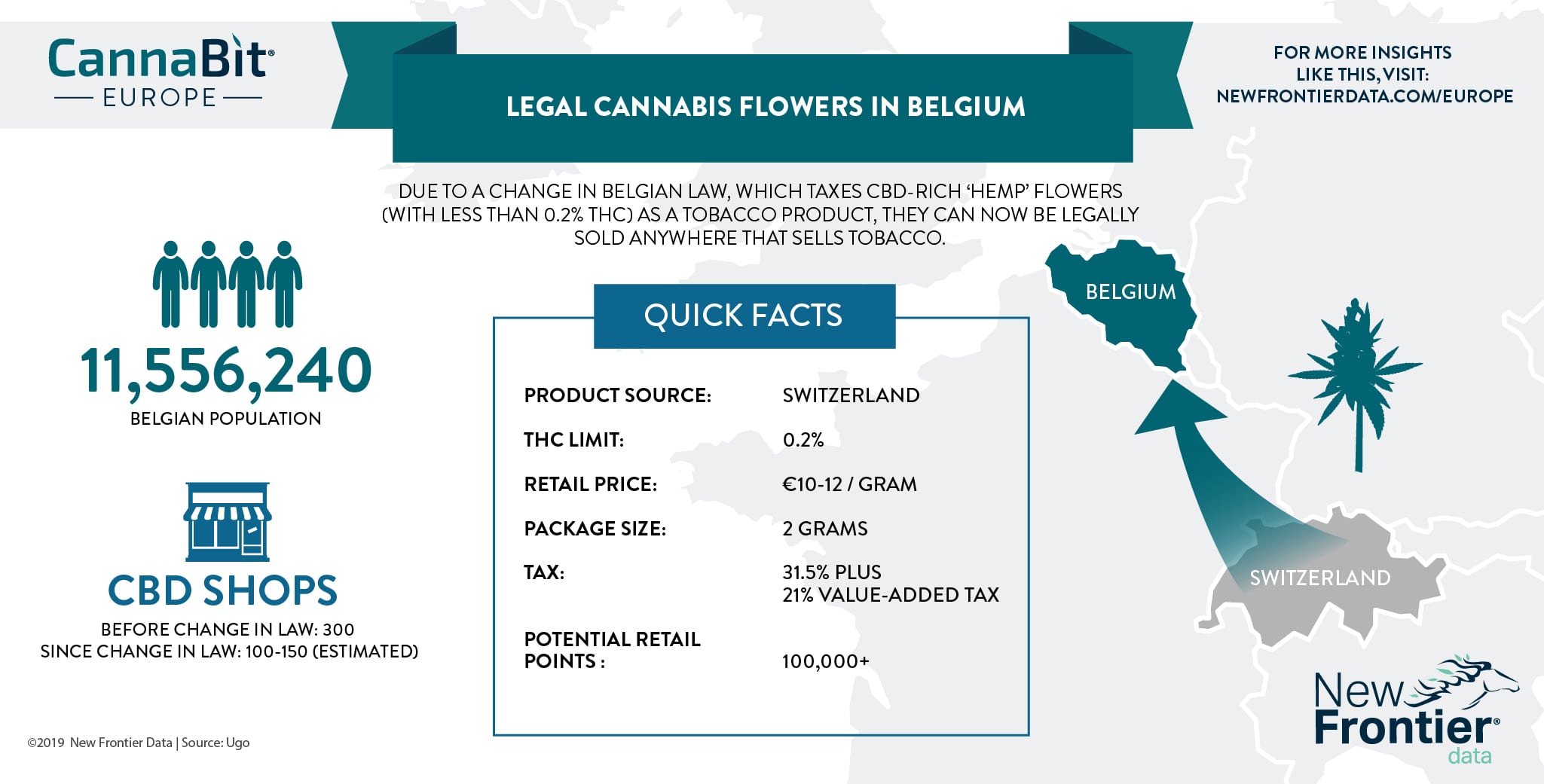By Bill Griffin, Special Contributor to New Frontier Data
Thanks to some recent legislative changes, anyone wanting to purchase cannabis buds in Belgium can simply stop by the nearest tobacconist.
Due to a loophole regarding CBD-rich cannabis flowers that are low in THC (i.e., less than 0.2%) as defined by Belgian regulators, some 200-300 self-styled CBD stores have popped up throughout the country in the past 16 months as enterprising entrepreneurs jumped to capitalize from the situation. It opened a legal grey area, in which products were clearly (if disingenuously) marked as "not for human consumption".
Since neither European Union regulations nor Belgium's national laws specifically covered hemp-derived products marketed as CBD, the rush to market yielded forms commonly sold to be smoked, ingested or used as a topical on one's skin for widely purported if largely unresearched wellness claims. In the United States, where CBD has become widely popular, federal officials have been sending cease-and-desist letters to marketers while national policy is codified.

In Belgium, the pace of retail activity gained the attention of the Finance Department, which noted the potential for a significant tax windfall from hemp flower sales. Thus, since April 2019, dried hemp flowers have been legalized and classified as a tobacco product, taxed at a rate of 31.5% plus a 21% value-added tax (VAT).
Making them legally available wherever tobacco is sold opened the market to over 100,000 potential retail outlets. While such products are 100% legal across Europe, so far, the traditional social stigma surrounding cannabis has made it more difficult to get a similar level of buy-in from tobacco firms beyond the Belgian border.
"We import our flowers from Switzerland with all the European custom codes as tobacco products," explained Ugo Lemaire, CEO of Buddy Brussels, an import and distribution company founded in 2018. "We transport it ourselves, and we go to the custom border once we arrive in Belgium. We have a partnership with a tobacco manufacturer to store our flowers in their fiscal tobacco warehouse. This allows us to order fiscal labels (required for cigarette boxes) and to sell these flowers in bulk across Europe."
Once imported, the product is divided into 2-gram bags, with the necessary legal stickers applied before retail distribution for sales around €10-12 per gram through garages and convenience stores across the country.
"The current situation in Belgium is quite unique in Europe, Lemaire added. "Dried hemp flowers are now considered as ‘another tobacco for smoking', while edible products that contain CBD remain forbidden. It is the opposite situation in the UK, in Germany, and in The Netherlands, where flowers are forbidden and edible[s are] more or less legal."
The situation leaves Belgium as the only EU nation with a clear legislative framework concerning the sales of dried cannabis flowers. Meantime, Luxembourg has announced that it will follow the same model by December 1.
"We anticipate that the rest of Europe will go in the same direction, which is a huge opportunity for us," Ugo said. "We are still waiting for a harmonization of legislative frameworks across EU state members, and a clarification on the edibles to be able to make long term partnerships with foreign actors. The tobacco manufacturers outside of Benelux aren't really paying attention to CBD flowers now, as this whole context is still unclear."
In order to operate legally, Buddy Brussels needed a European Binding Tariff Information (BTI) decision. Currently, only four companies in Belgium are working in the space.
Since the law change, there was a significant drop in the number of CBD-specific stores which were able to compete with more established retailers. Approximately 100-150 shops remain; pending clarification regarding edibles and food supplements in Belgium, their future is unclear.
The niche features some quirks. For one, it is illegal to indicate the percentage of CBD or THC on the product packaging, though it might help consumers to differentiate between products. Also, all of the products sold in Belgium are grown and processed in Switzerland, which is not an EU member, and thus not restricted to the 70 permitted strains available to other European hemp farmers. The dynamic allows Swiss cultivators to create hemp strains with similar terpene profiles to those of recreational or medicinal cannabis. The resulting buds look and smell like what is found in a Dutch coffeeshop or U.S. dispensary, proving popular with consumers.
Enforcement is also an issue, as Belgian police generally lack the resources to test every product to be found sold legally through so many locations.
As things stand, Belgium has become the first European country with a legalized market for cannabis flowers, however unintentionally. Given that, the only remaining barrier to a full adult-use market is the 0.2% THC limit.
The post Cannabis Flowers are Legal in Belgium, and Nobody Noticed appeared first on New Frontier Data.
The preceding article is from one of our external contributors. It does not represent the opinion of Benzinga and has not been edited.
© 2025 Benzinga.com. Benzinga does not provide investment advice. All rights reserved.
Trade confidently with insights and alerts from analyst ratings, free reports and breaking news that affects the stocks you care about.
Cannabis is evolving – don’t get left behind!
Curious about what’s next for the industry and how to leverage California’s unique market?
Join top executives, policymakers, and investors at the Benzinga Cannabis Market Spotlight in Anaheim, CA, at the House of Blues on November 12. Dive deep into the latest strategies, investment trends, and brand insights that are shaping the future of cannabis!
Get your tickets now to secure your spot and avoid last-minute price hikes.